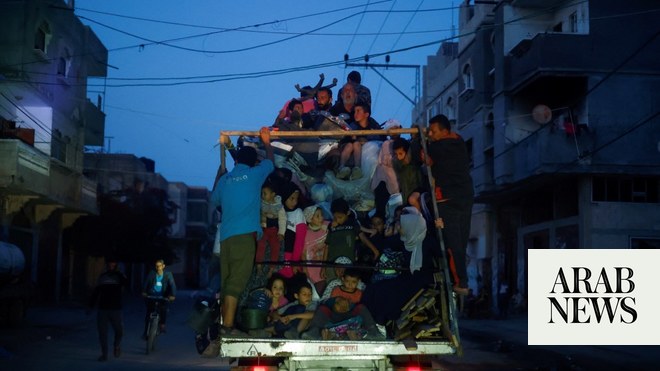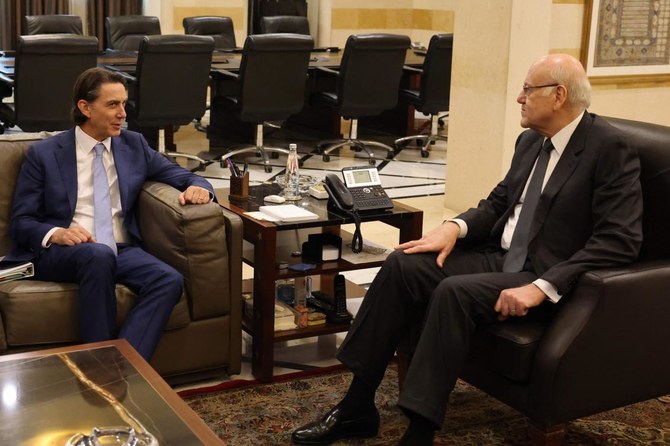
Amos Hochstein’s comment follows talks with Speaker Nabih Berri and Prime Minister Najib Mikati in Beirut on Tuesday
Mikati’s office says the ‘priority is to have a ceasefire and stop the aggression against Lebanon, as well as to preserve Lebanese sovereignty over all Lebanese territories’
BEIRUT: An agreement to end the war between Israel and Hezbollah is “within our grasp,” US envoy Amos Hochstein said after talks in Lebanon on Tuesday.
It followed his meeting in Beirut with Lebanese officials, during which they gave their response to a US-drafted proposal for a ceasefire and diplomatic solution to the conflict, prepared in coordination with Israeli Prime Minister Benjamin Netanyahu. Hochstein will travel to Tel Aviv on Wednesday for talks with the Israelis.
The draft peace proposal focuses on the implementation of UN Security Council Resolution 1701, which was adopted in 2006 with the aim of resolving the war that year between Israel and Hezbollah and is overseen on the ground by the UN Interim Force in Lebanon. The proposal includes additional provisions, including “expanding the monitoring committee” overseeing implementation of the resolution, and a leaked Israeli condition “guaranteeing its right to breach Lebanese airspace for reconnaissance and to respond to any Lebanese violation of the agreement.”
Hochstein held extensive talks during a two-hour meeting with the speaker of the Lebanese parliament, Nabih Berri, who has been authorized by Hezbollah to conduct negotiations for a ceasefire. Afterwards, Hochstein said the conversation had been “very constructive and useful.”
He added: “We will reach a solution in the coming days. There is a serious opportunity for a ceasefire and I am grateful for the constructive discussions with Nabih Berri and, later, with Prime Minister Najib Mikati.”
Hochstein, who also met Lebanon’s army chief, said he had returned to Beirut because “we have a genuine opportunity to reach a resolution to the conflict and the decision remains in the hands of the parties involved. The solution is now within our grasp and there is a window of opportunity.”
Tuesday’s discussions “were aimed at narrowing the differences and we will continue with them,” he added.
Mikati’s office said he “reiterated that the government’s priority is to have a ceasefire and stop the aggression against Lebanon, as well as to preserve Lebanese sovereignty over all Lebanese territories. Any measures that achieve this objective are of utmost priority.”
The prime minister conveyed that the “primary concern of the government is the swift return of displaced individuals to their villages and towns, as well as the cessation of the Israeli acts of genocide and the senseless destruction occurring in Lebanese towns.”
He also stressed “the importance of implementing clear international resolutions and strengthening the authority of the army in the south.”
There had been considerable uncertainty on Monday night about whether Hochstein’s visit would proceed. He had a lengthy telephone conversation, lasting two hours, with Berri, after which the latter confirmed the American envoy would visit Beirut the following day.
Also on Monday night, an Israeli airstrike hit a working-class neighborhood of Beirut in which hundreds of displaced individuals were living, killing five people and injuring 35. In response, Hezbollah fired a missile at Tel Aviv, reportedly resulting in human and material losses.
Hezbollah’s media office had announced that the head of the organization, Naim Qassem, would give a speech on Tuesday but the party later said this “has been postponed until a date to be determined later.”
There were several hours of tense calm in Beirut and its southern suburbs during Hochstein’s visit to the city on Tuesday. This followed an Israeli airstrike early in the morning that hit a four-story residential building in Ghobeiry, in the southern suburbs, without warning. Two people were killed and several injured while they slept.
Elsewhere, skirmishes continued between Hezbollah and Israeli army forces in the border villages of Chamaa, Tayr Harfa and Al-Bayada.
Hezbollah said it “repelled eight incursion attempts in the southeastern outskirts of Khiam” and “burned three Israeli military Merkava tanks.”
The Israeli army said it killed “Hezbollah"s medium-range rocket system commander, Ali Toufic Al-Doueik, in Kfar Joz.” Israeli raids, carried out without prior warning, destroyed houses in Yohmor Al-Shkeif, Tyre, Bazourieh and Ghandourieh. And areas around the Litani River in the outskirts of Deir Mimas were targeted by Israeli artillery.
A raid on Adloun destroyed a three-story building, injuring seven people. In Qana, Israeli forces attacked a Hezbollah Islamic Health Organization facility, killing two paramedics. One person was killed by an attack in Chabriha and another in Al-Majadel, and three were killed in Maarakeh.
Hezbollah said it carried out a series of military operations in the past 24 hours, including “aerial strikes with attack drones against sensitive Israeli military positions in Tel Aviv.”
The militant group attacked “the Ramat David base southeast of Haifa, and the Beit Lid base, a military base containing training camps, about 90 kilometers east of Netanya.” Other targets included “a paratrooper training base in the Karmiel settlement, Safed, and the Galilot base, headquarters of military intelligence unit 8200, in Tel Aviv’s suburbs.”
The Israeli army said its “98th Division continues its operations in several areas in southern Lebanon” and had “raided a Hezbollah central stronghold.” Officials added that “11 soldiers were injured in southern Lebanon’s conflicts in the past 24 hours.”
The UN Interim Force in Lebanon said its “ability to carry out monitoring tasks in its mission area south of the Litani River has become extremely limited due to the ongoing conflict, which has resulted in the destruction of part of UNIFIL’s infrastructure.”












